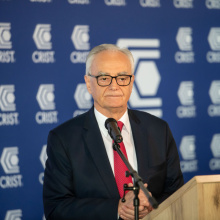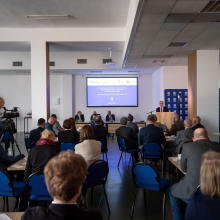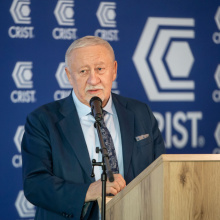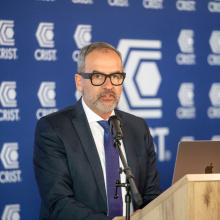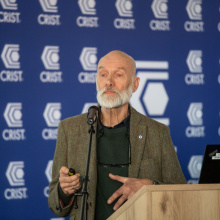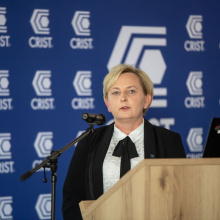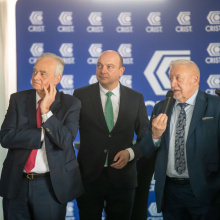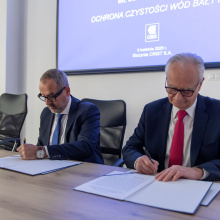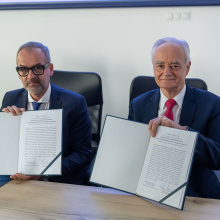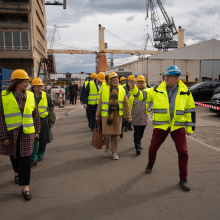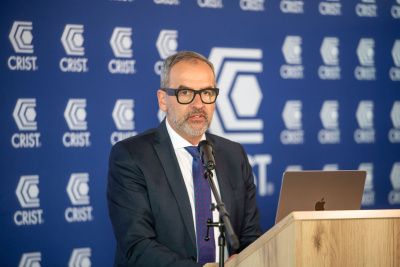
‘The Baltic Sea is a common good, and its future depends on actions taken at the global level.’ The Baltic Sea was the theme of the 6th meeting of the Economic Convention at the Fahrenheit Union of Universities in Gdańsk. The members of the Convention adopted an appeal for the cleaning and protection of the Baltic Sea.
The next meeting took place on 9 April this year at the headquarters of Stocznia CRIST S.A., a leader in the construction of specialised vessels for the seas and oceans. The meeting was opened by dr Zbigniew Canowiecki, Chairman of the Economic Convention at FarU. The guests were welcomed to the shipyard by the host, President Ireneusz Ćwirko. The opening speech was also given by the Rector of the University of Gdańsk and Chairman of the Assembly of The Fahrenheit Union of Universities in Gdańsk, prof. dr hab. Piotr Stepnowski, who inaugurated a series of presentations by talking about the research conducted at the University of Gdańsk on monitoring the condition of the Baltic Sea waters.
The University of Gdańsk, which is celebrating its 55th anniversary this year, has always paid special attention to the sea, which is reflected in the university's motto: in mari via tua – the sea is your way. Research focused on monitoring the waters of the Baltic Sea and the state of the Baltic ecosystem is the core of the research interests of scientists from the Faculty of Oceanography and Geography at the University of Gdańsk. The university also has a comprehensive research infrastructure for marine research, including one of the most modern research vessels in Europe, the r/v Oceanograf, as well as research stations: the Professor Krzysztof Skóra Marine Station in Hel and the Water Monitoring and Protection Centre in Borucin. As noted by Prof. Piotr Stepnowski, effective protection of the Baltic Sea requires thinking on a much broader territorial scale: the exchange of water between the Baltic Sea and the oceans is extremely slow (statistically, a complete exchange takes about 30 years), while the Baltic Sea itself is fed by 250 rivers and surrounded by heavily industrialised countries, one of which is Poland:
- 99.7% of Poland lies within the Baltic Sea catchment area, reminded the Rector. - This means that all pollution from our country, in one form or another, also ends up in the Baltic Sea.
The second speaker was prof. Jan Marcin Węsławski, Director of the Institute of Oceanology of the Polish Academy of Sciences. He presented statistics confirming that the sea closest to Poland is one of the fastest warming marine areas in the world, which is the result of global processes with enormous inertia. He also explained the complexity of the situation we find ourselves in – international cooperation within HELCOM (Baltic Sea Action Plan) is bringing results, for example in the form of reduced concentrations of fertilisers in the sea, but despite public expectations, we do not have influence over everything, such as the degassing of the sea.
The issue of pollution was also raised by prof. dr hab. inż. Krzysztof Wilde, rector of Gdańsk University of Technology, who drew particular attention to the problem of chemical weapons disposal. The GdańskTech Security and Defence Technology Centre was established to conduct research and implementation in the field of security technology. More about the unit's activities was presented by dr hab. inż. Justyna Kucińska-Lipka, prof. GdańskTech, Vice-Rector for Development at GdańskTech.
In turn, Ireneusz Ćwirko, President of the Management Board of CRIST S.A., in his presentation ‘Platform for the extraction and disposal of pollutants’ discussed the effects of seabed cleaning operations using remotely operated underwater vehicles (ROVs). However, he emphasised that such a process requires not only modern solutions, but also international cooperation, because the Baltic Sea is a common good and its future depends on actions taken at the global level.
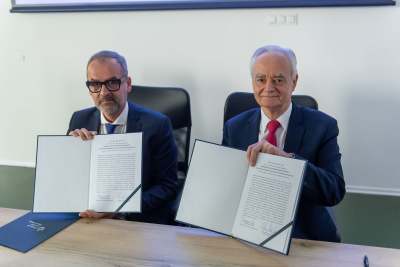
The most important point on the agenda was the adoption of an appeal by the members of the FarU Economic Convention for the clean-up and protection of the Baltic Sea. The appeal supports the Position of the Climate and Environment Committee and the Foreign Affairs Committee of the Polish Senate on the safety and protection of the Baltic Sea, adopted in Gdynia on 2 September 2024. The Pomeranian economic and scientific communities thus declare their joint action, including in the field of pollution monitoring, the development of technical methods for the disposal of chemical weapons and the construction of an autonomous platform for the inspection of critical maritime infrastructure. The appeal also emphasised the readiness of the CRIST S.A. shipyard in Gdynia to immediately commence the construction of vessels for the recovery and disposal of chemical weapons lying on the bottom of the Baltic Sea.
During the meeting, a Declaration on joining the Pomeranian Coalition for the Development of Data Processing Centres and AI Industry, established on the initiative of the Baltic Energy Transition Institute, was also adopted. The rectors of the Medical University of Gdańsk, Gdańsk University of Technology and the University of Gdańsk, members of the Gdańsk University Association named after Daniel Fahrenheit, and representatives of the Pomeranian business community who are members of the Economic Convention at the Fahrenheit University Association, recognise in the document that innovation, digitalisation of energy and the development of smart technologies are key factors for the development of the Pomeranian region. The joint efforts are intended to contribute to the creation of a strong ecosystem that will not only attract investment but also enable the long-term development of the Pomeranian economy based on innovation, digitalisation of energy, quantum computers and green energy. Joint efforts are to contribute to building a strong ecosystem that will not only attract investment but also enable the long-term development of the Pomeranian economy based on knowledge and technology.

